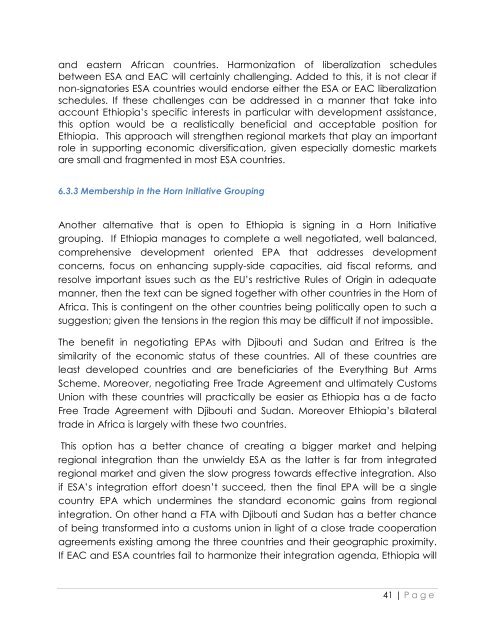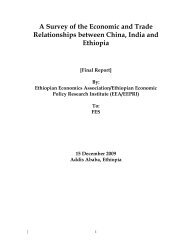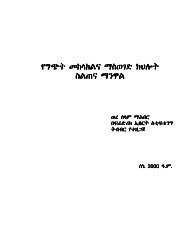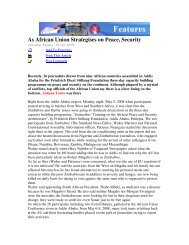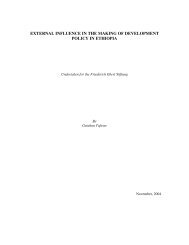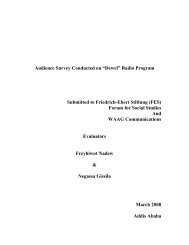Ethiopia and EPA Negotiation 2008 - FES Ethiopia
Ethiopia and EPA Negotiation 2008 - FES Ethiopia
Ethiopia and EPA Negotiation 2008 - FES Ethiopia
Create successful ePaper yourself
Turn your PDF publications into a flip-book with our unique Google optimized e-Paper software.
<strong>and</strong> eastern African countries. Harmonization of liberalization schedules<br />
between ESA <strong>and</strong> EAC will certainly challenging. Added to this, it is not clear if<br />
non-signatories ESA countries would endorse either the ESA or EAC liberalization<br />
schedules. If these challenges can be addressed in a manner that take into<br />
account <strong>Ethiopia</strong>’s specific interests in particular with development assistance,<br />
this option would be a realistically beneficial <strong>and</strong> acceptable position for<br />
<strong>Ethiopia</strong>. This approach will strengthen regional markets that play an important<br />
role in supporting economic diversification, given especially domestic markets<br />
are small <strong>and</strong> fragmented in most ESA countries.<br />
6.3.3 Membership in the Horn Initiative Grouping<br />
Another alternative that is open to <strong>Ethiopia</strong> is signing in a Horn Initiative<br />
grouping. If <strong>Ethiopia</strong> manages to complete a well negotiated, well balanced,<br />
comprehensive development oriented <strong>EPA</strong> that addresses development<br />
concerns, focus on enhancing supply-side capacities, aid fiscal reforms, <strong>and</strong><br />
resolve important issues such as the EU’s restrictive Rules of Origin in adequate<br />
manner, then the text can be signed together with other countries in the Horn of<br />
Africa. This is contingent on the other countries being politically open to such a<br />
suggestion; given the tensions in the region this may be difficult if not impossible.<br />
The benefit in negotiating <strong>EPA</strong>s with Djibouti <strong>and</strong> Sudan <strong>and</strong> Eritrea is the<br />
similarity of the economic status of these countries. All of these countries are<br />
least developed countries <strong>and</strong> are beneficiaries of the Everything But Arms<br />
Scheme. Moreover, negotiating Free Trade Agreement <strong>and</strong> ultimately Customs<br />
Union with these countries will practically be easier as <strong>Ethiopia</strong> has a de facto<br />
Free Trade Agreement with Djibouti <strong>and</strong> Sudan. Moreover <strong>Ethiopia</strong>’s bilateral<br />
trade in Africa is largely with these two countries.<br />
This option has a better chance of creating a bigger market <strong>and</strong> helping<br />
regional integration than the unwieldy ESA as the latter is far from integrated<br />
regional market <strong>and</strong> given the slow progress towards effective integration. Also<br />
if ESA’s integration effort doesn’t succeed, then the final <strong>EPA</strong> will be a single<br />
country <strong>EPA</strong> which undermines the st<strong>and</strong>ard economic gains from regional<br />
integration. On other h<strong>and</strong> a FTA with Djibouti <strong>and</strong> Sudan has a better chance<br />
of being transformed into a customs union in light of a close trade cooperation<br />
agreements existing among the three countries <strong>and</strong> their geographic proximity.<br />
If EAC <strong>and</strong> ESA countries fail to harmonize their integration agenda, <strong>Ethiopia</strong> will<br />
41 | P a g e


